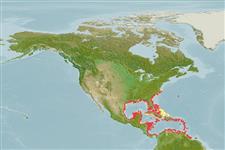分类 / Names
俗名 | 同种异名 | Catalog of Fishes(属, 种) | ITIS | CoL | WoRMS | Cloffa
Teleostei >
Gobiiformes (Gobies) >
Gobiidae (Gobies) > Gobionellinae
Etymology: Evorthodus: Greek, eu = good + Greek, ortho = right + Greek, odous = teeth (Ref. 45335).
More on author: Girard.
Environment: milieu / climate zone / depth range / distribution range
生态学
海洋; 淡水; 半咸淡水 居于水底的; 非产卵性溯降河的 (Ref. 46888). 亞熱帶的; 20°C - 30°C (Ref. 2059); 40°N - 7°N
Western Atlantic: Chesapeake Bay, USA and northern Gulf of Mexico to northern South America; absent in the Bahamas, but present in Greater Antilles.
西大西洋: 切薩皮克海灣,美國與墨西哥灣北部到南美洲北部; 不存在於巴哈馬, 但是出現在大安地列斯群島。
大小 / 重量 / 年龄
Maturity: Lm ? range ? - ? cm
Max length : 15.0 cm TL 雄鱼/尚未辨别雌雄; (Ref. 26340)
背棘 (总数) : 6; 背的软条 (总数) : 11; 臀棘: 0; 臀鳍软条: 12. Caudal fin large and bluntly pointed with dark lyre-shaped mark on base consisting of 2 dark spots separated by pale central area. Snout very short, mouth small and inferior. Adults have first 3 or 4 dorsal fin spines elongate, reaching from third to sixth ray of second dorsal in females, to base of caudal peduncle in males. Predorsal area and top of head scaled as far forward as eye (Ref. 26938).
尾鳍大而顿尖的有深色的七弦琴-形状的标志在基底上包含被灰白中央的区域分开的 2个深色的斑点。 吻非常短的, 嘴小而下方的。 第一个成鱼有 3 或 4 背鳍棘延长,在雌性中从第三达到到第二背鳍的第六鳍条,对在雄性中的尾柄的基底。 前背的区域与头顶像眼一样的非常向前覆有鳞片的 (. 参考文献 26938)
Occur mainly in muddy backwaters of bays and estuaries, often in foul waters. Also found on muddy bottoms of fresh water (Ref. 13628).
主要生活在海湾与河口的泥泞洄水区,常见于污秽的瓦盖上水域中。 也发现于淡水的泥底部。 (参考文献 13628)
Life cycle and mating behavior
成熟度 | 繁殖 | 产卵场 | 卵 | 孕卵数 | 仔鱼
Benthic spawner.西大西洋: 切薩皮克海灣,美國與墨西哥灣北部到南美洲北部; 不存在於巴哈馬, 但是出現在大安地列斯群島。
Robins, C.R. and G.C. Ray, 1986. A field guide to Atlantic coast fishes of North America. Houghton Mifflin Company, Boston, U.S.A. 354 p. (Ref. 7251)
世界自然保护联盟红皮书 (Ref. 130435: Version 2024-1)
人类利用
工具
特别资料
下载 XML
网络资源
Estimates based on models
Preferred temperature (Ref.
123201): 23.5 - 28.2, mean 27.1 °C (based on 636 cells).
Phylogenetic diversity index (Ref.
82804): PD
50 = 0.7500 [Uniqueness, from 0.5 = low to 2.0 = high].
Bayesian length-weight: a=0.00977 (0.00444 - 0.02153), b=3.04 (2.85 - 3.23), in cm total length, based on LWR estimates for this (Sub)family-body shape (Ref.
93245).
营养阶层 (Ref.
69278): 3.5 ±0.5 se; based on size and trophs of closest relatives
回复力 (Ref.
120179): 高度, 族群倍增时间少于 15个月 (Preliminary K or Fecundity.).
Fishing Vulnerability (Ref.
59153): Low vulnerability (10 of 100).
